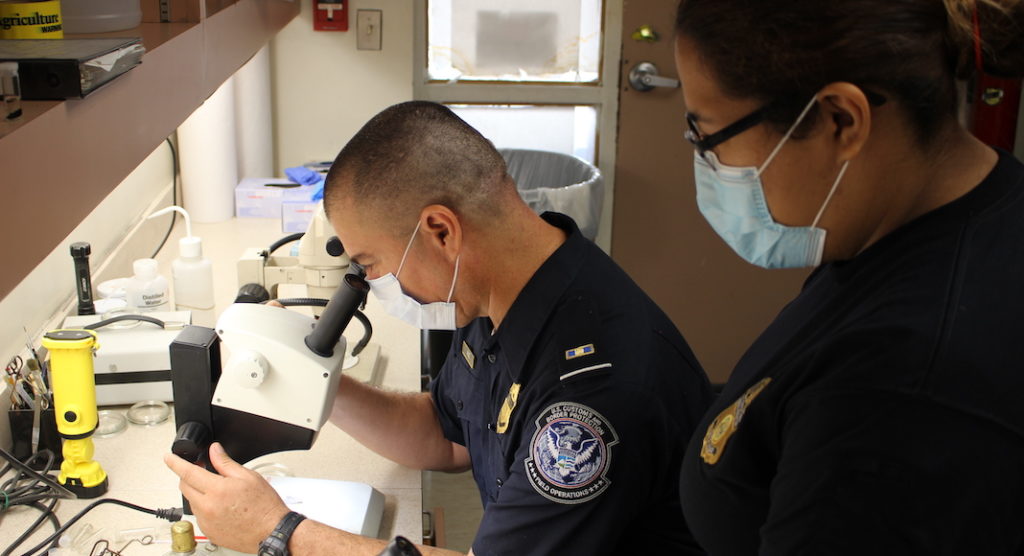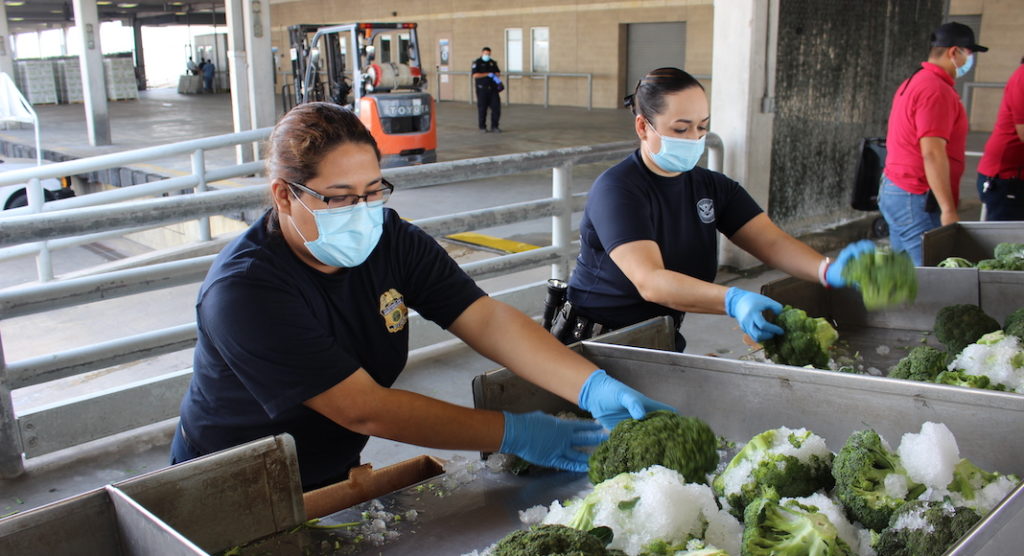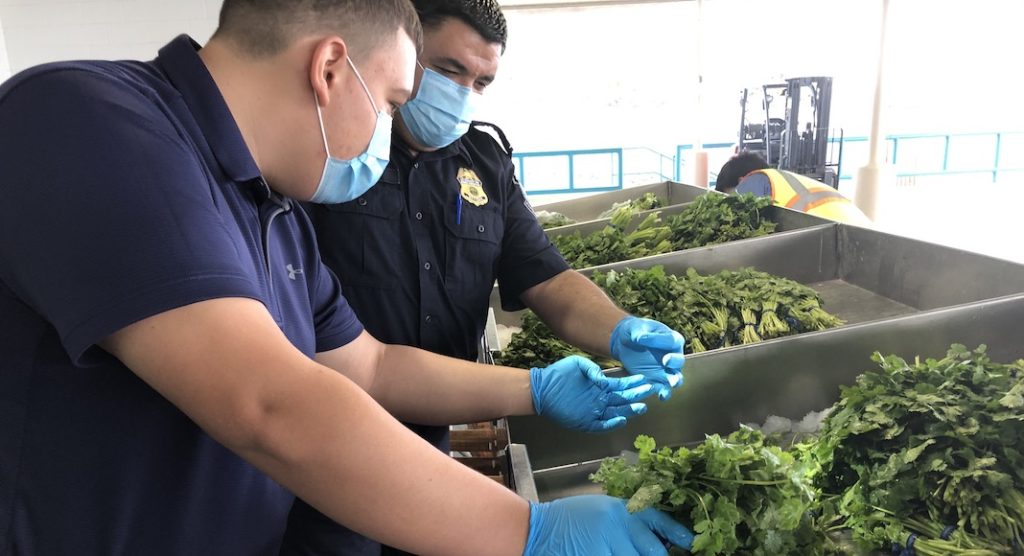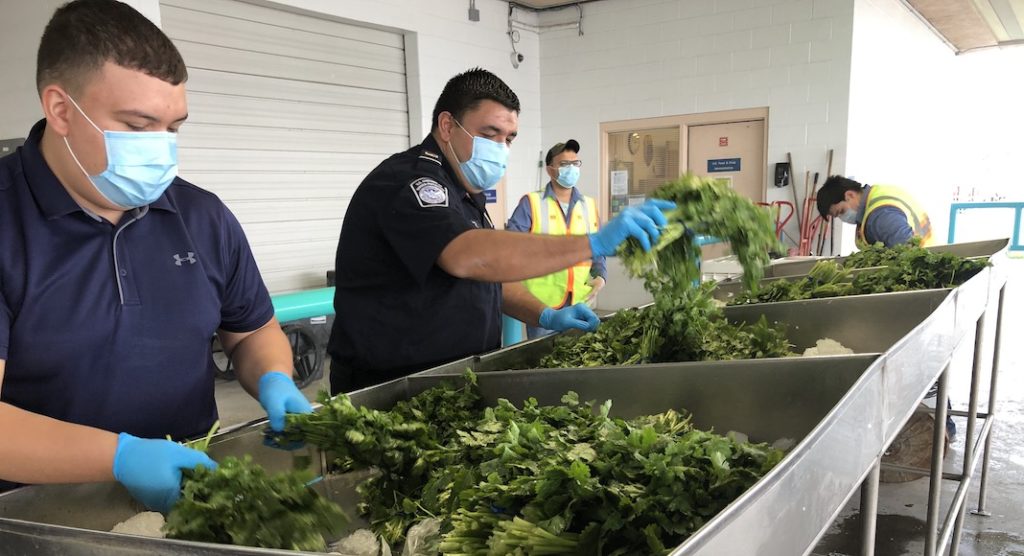
Texas Border Business
PHARR, Texas – Working together with private sector, higher education partners, the South Texas Assets Consortium (STAC) and the University of Texas Rio Grande Valley (UTRGV), U.S. Customs and Border Protection is gaining up to 10 paid agriculture interns that learn valuable work skills while assisting CBP to process commercial produce shipments at Rio Grande Valley ports of entry.
“This is a fantastic opportunity to help provide local college students looking for an agricultural/biological sciences career, possibly as a future CBP agriculture specialist, to learn valuable agriculture inspection, pest interception skills while assisting CBP to efficiently process the significant volume of commercial produce we see on a daily basis at Pharr and Rio Grande City ports of entry,” said Director of Field Operations, Randy Howe, Laredo Field Office.

With funding provided through CBP’s Reimbursable Services Program, STAC funds a grant that allows up to 10 college students to serve as paid agriculture interns with CBP at the ports of entry that fall within the STAC area. Currently UTRGV is providing three interns; two at Pharr International Bridge and one at Rio Grande City Port of Entry. The students work alongside CBP agriculture specialists, assist with agricultural cargo inspections. They receive classroom, virtual and on-the-job training with CBP and need to pursue a course of study in the biological sciences to qualify for the internship.
A clear benefit for the students who participate in the agriculture internship program with CBP is the real-word experience they gain, which, coupled with their education track in the biological sciences makes them a better-suited candidate for the CBP agriculture specialist position, which they can apply for when vacancy announcements open via www.usajobs.gov.
The entire fresh produce industry is excited to see this internship program come to fruition, said President and CEO Dante Galeazzi, Texas International Produce Association. This was a project several groups starting working on in 2017, and persistence on the part of all the partners has made this program a reality. The more than $7 billion of fresh produce that crosses from Mexico into the United States through Texas is dependent on sufficient staffing levels of CBP agriculture specialists and technicians at our ports of entry. This internship not only trains college students with the skills they’ll need to assume such a role with CBP following graduation, but more importantly the program builds a pool of qualified individuals that any of the numerous bridges crossing fresh produce in Texas can access to fill personnel needs, Galeazzi added.
In 2019, Texas crossed nearly 230,000 truckloads of fresh produce. That’s a growth of more than 127% since 2007, and is in-line with growth projections that show the industry continuing to grow for the next several decades. The Pharr International Bridge was responsible for handling nearly 80% of that volume, and continues to hold the post as the bridge which crosses the most fresh produce loads annually in all of the United States. Yet, in order keep up this growth and maintain efficient operations for produce crossings along the border, the staffing levels must also grow. This program is a mechanism to develop the next generation of CBP agriculture specialists and technicians needed to grow that personnel parallel to the growth of the industry.

“Truly, our hats are off to the Pharr International Bridge and Starr-Camargo Bridge teams for their dedication in establishing this program and of course agreeing to fund the internships; to the team at CBP Laredo Field Office who worked tirelessly with headquarters in DC to create this first-in-nation program; and to the staff at UTRGV who provided the connection with the students and created this incredible in-road that we hope will spread to the many other federal agencies working at Texas ports-of-entry that depend on cultivating talented, local individuals for careers in these government roles,” Galeazzi said.
Dr. Alex Racelis, assistant professor in the UTRGV School of Earth, Environmental, and Marine Sciences with a joint appointment in the Department of Biology, said the university is enthusiastic about this collaboration with CBP and STAC.
“This partnership embodies the mission of UTRGV, as it serves not only our students who rely on us to prepare them for employment after graduation, but also our community partners, who look to UTRGV as a source of well-prepared, career-ready graduates,” Racelis said.
“With support from STAC, we can intentionally integrate our students’ education with career preparation. We want our students to be aware and to develop the professional competencies and knowledge they need to join the workforce of tomorrow — and what better way than through the relevant, experiential learning that these internships provide,” he said.
CBP would also like to thank UTRGV College of Sciences Director of Development Roxanna Vasquez-Lucio for her early work and coordination in getting the internship program going. CBP also thanks its municipal partners with City of Pharr.
“As leaders in Pharr, we have always prioritized supporting educational opportunities for our residents as a path toward economic prosperity and sustainability, and we have enjoyed various partnerships in our creative endeavors throughout the years,” said Mayor Ambrosio Hernandez, M.D., City of Pharr. “With Pharr’s proximity to the border and as the number one land port of entry for crossing fresh produce from Mexico, it was the perfect setting to develop these real-world experiential learning opportunities to train agricultural inspectors, ultimately fostering a pipeline toward a future career in the industry,” he added. “With the right partners in place, including CBP, STAC, TIPA, and UTRGV, this innovative program truly embodies Pharr’s vision of supporting education in our community,” Hernandez added.

The entire fresh produce industry is excited to see this internship program come to fruition, said President and CEO Dante Galeazzi, Texas International Produce Association. This was a project several groups starting working on in 2017, and persistence on the part of all the partners has made this program a reality. The more than $7 billion of fresh produce that crosses from Mexico into the United States through Texas is dependent on sufficient staffing levels of CBP agriculture specialists and technicians at our ports of entry. This internship not only trains college students with the skills they’ll need to assume such a role with CBP following graduation, but more importantly the program builds a pool of qualified individuals that any of the numerous bridges crossing fresh produce in Texas can access to fill personnel needs, Galeazzi added.
In 2019, Texas crossed nearly 230,000 truckloads of fresh produce. That’s a growth of more than 127% since 2007, and is in-line with growth projections that show the industry continuing to grow for the next several decades. The Pharr International Bridge was responsible for handling nearly 80% of that volume, and continues to hold the post as the bridge which crosses the most fresh produce loads annually in all of the United States. Yet, in order keep up this growth and maintain efficient operations for produce crossings along the border, the staffing levels must also grow. This program is a mechanism to develop the next generation of CBP agriculture specialists and technicians needed to grow that personnel parallel to the growth of the industry.
“Truly, our hats are off to the Pharr International Bridge and Starr-Camargo Bridge teams for their dedication in establishing this program and of course agreeing to fund the internships; to the team at CBP Laredo Field Office who worked tirelessly with headquarters in DC to create this first-in-nation program; and to the staff at UTRGV who provided the connection with the students and created this incredible in-road that we hope will spread to the many other federal agencies working at Texas ports-of-entry that depend on cultivating talented, local individuals for careers in these government roles,” Galeazzi said.
For more information about CBP’s Reimbursable Services Program, click on this link. For more information about CBP’s agriculture mission, click on the following link.













